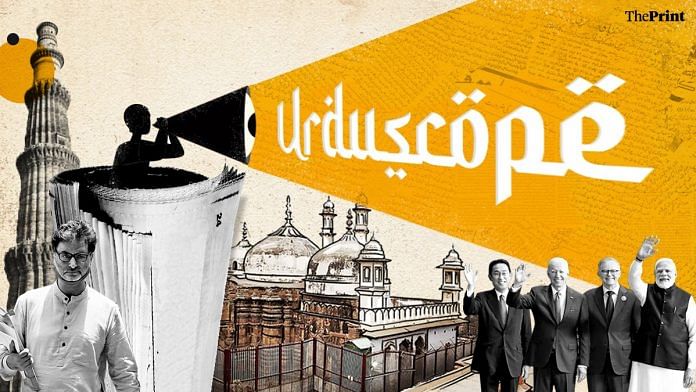New Delhi: The ongoing legal battles for worship rights at Varanasi’s Gyanvapi mosque and Qutub Minar and the Shahi Idgah vs Krishna Janmabhoomi case remained the top focus of this week’s coverage by Urdu newspapers, while Kashmiri separatist Yasin Malik’s life sentence and India’s presence at the Quad summit jostled for space too.
The papers also touched upon the Congress’ reaction to eight years of the Modi government, the low attendance at madrasas, and the media’s portrayal of the Israel-Palestine crisis.
ThePrint brings you a wrap of headlines and editorials in the Urdu press this week.
Also read: Aibak, Akbar, Aurangzeb—the Gyanvapi divide & why a controversial mosque has a Sanskrit name
On Gyanvapi, Shahi Idgah & Qutub Minar row
The following day, Inquilab and Sahara carried front-page articles on large gatherings being banned within 500 metres of Mangaluru’s Malali Juma Masjid, after the Vishva Hindu Parishad claimed that a temple-like architecture had been found during digging at the mosque.
The Yasin Malik verdict
On 26 May, both Inquilab and Sahara covered on their front pages news of Kashmiri separatist Yasin Malik being sentenced to life imprisonment by a NIA court in a 2017 terror-funding case.
Sahara also reported on Pakistan Foreign Minister Bilawal Bhutto Zardari writing to the United Nations High Commissioner for Human Rights, Michelle Bachelet, to urge India to acquit Malik of all charges and ensure his speedy release from prison. The paper also covered former Pakistani cricketer, Shahid Afridi, voicing support for Malik.
Opposition on 8 years of Modi govt
On 27 May, Sahara and Inquilab reported on their front page that the Congress will visit 140 parliamentary constituencies in the country and campaign on the “Modi’s government’s failures”, on the occasion of the NDA government at the Centre completing eight years.
On 25 May, Inquilab featured front-page coverage on former Congress president Rahul Gandhi slamming the BJP government at a programme at Cambridge University in England. Gandhi also spoke about the role of the Gandhi family in the Congress, and the isolation of “50 million Indians” (a reference to the country’s religious minorities) as a result of the BJP’s “politics of polarisation”, reported the paper.
The following day, Inquilab, Siasat and Sahara carried news of veteran Congress leader Kapil Sibal leaving the party. Inquilab also wrote of Sibal and Samajwadi Party chief Akhilesh Yadav’s wife, Dimple, filing nomination for the Rajya Sabha from UP.
News of the ongoing Uttar Pradesh assembly session — from the governor’s address, to Samajwadi Party and Rashtriya Lok Dal members going to the well — was also carried in detail.
PM at Quad
On 24 May, Inquilab, Siasat and Sahara, carried details of PM Modi’s address to the Indian diaspora in Japan, ahead of his attendance at the Quad Summit in Tokyo. The papers quoted the PM as saying that such a phase of India’s development and prosperity will be written during the ‘Azadi Ka Amrit Mahotsav (celebration of 75 years of Indian Independence)’ that it will be impossible to erase.
The following day, Inquilab and Sahara reported the PM as saying at a bilateral meeting with US President Joe Biden that India’s partnership and friendship with the United States was a force for good for global peace and stability and for the well-being of humanity. The meeting was held on the sidelines of the Quad summit.
The same day, Sahara also reported that leaders of the Quad countries — US, India, Japan and Australia — had condemned terrorism in all its forms and manifestations, including the 26/11 terrorist attacks on Mumbai, and said that it was against all terrorist organisations.
Media on Israel-Palestine conflict
In an editorial on 25 May, Inquilab referred to an opinion piece published in The Washington Post, titled ‘How media coverage whitewashes Israeli state violence against Palestinians’. The Post piece, on Ukraine comparing its invasion by Russia to Israeli violence against Palestine, observed that the situation between Israel and Palestine is often referred to as “mutual tension”, without news agencies realising that there was no comparison between the strengths of the Israeli military and “weak Palestinian citizens”.
According to the Inquilab editorial, the Post‘s columnists wrote that these newspapers and media houses do not understand the magnitude of lives lost in Israeli raids on Palestine. So, these media houses hold the Palestinians equally responsible. For them, there is no difference between the oppressor and the oppressed, they wrote.
The state of madrasas
In an editorial on 23 May, Inquilab addressed the issue of madrasa dropouts. The paper wrote that, while it had been hoped that those who had stopped going to the madrasas because of the Covid pandemic, would return once classes resumed, reports from various madrasas indicated continuing low attendance.
The editorial rued that, owing to financial difficulties, many of the students may be engaged in odd jobs and therefore may not return to classes.
On 24 May, Inquilab carried a front-page article on Assam Chief Minister Himanta Biswa Sarma reportedly saying that the word madrasa should cease to exist.
(Edited by Poulomi Banerjee)
Also read: Adopting families of troops killed in action & more — BJP plans for Modi govt’s 8th anniversary



